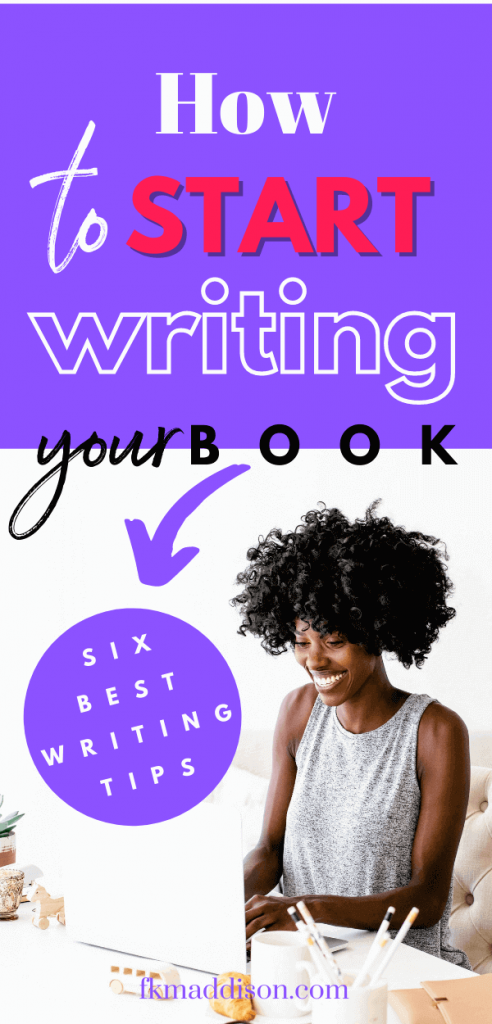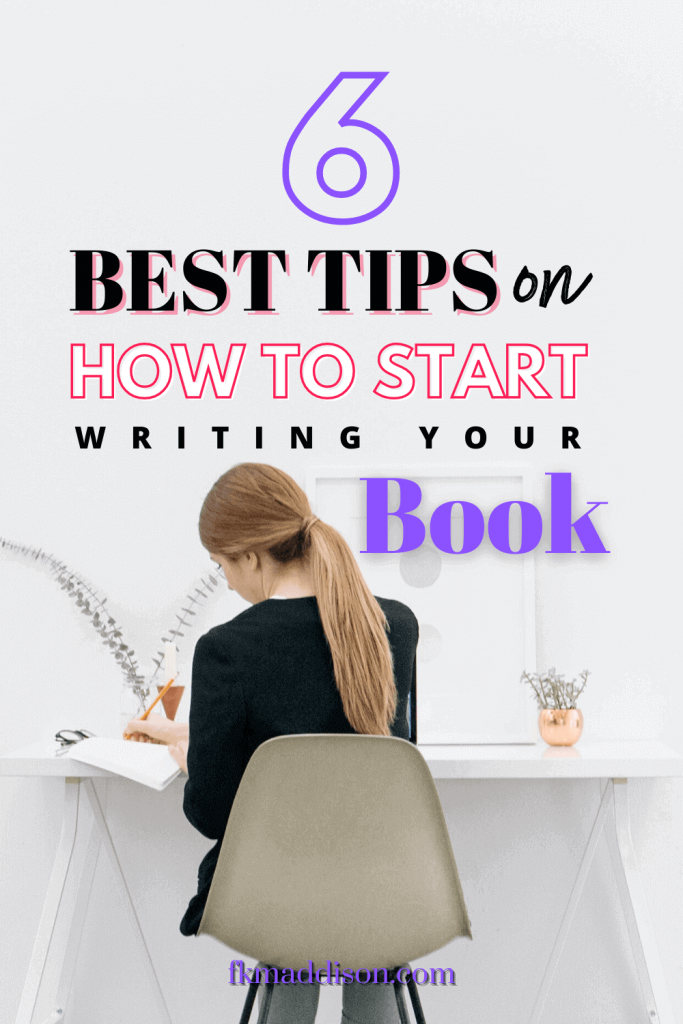Starting a book can be hard, and more so when you are writing a book for the first time; I know – I’ve been there, but trust me, it does get easier once you get going. However, if you want to write then the onus is on you to do it – your idea is not just going to fall out of your brain and land neatly and all written up for you on the page … well, unless you are using a ghostwriter to help you. Either way, it takes time, focus and dedication, and you also have to overcome a few hurdles before you even begin.
So let’s start with my top 6 tips on how to start writing your first book.
This post may contain affiliate links, which means I’ll receive a small commission if you purchase through my links and images, at no extra cost to you. Please read the full disclosure here.
1 | Stop Talking About Writing Your Book and … Well … WRITE Your Book!
You’ve been talking to your friends, family and colleagues about how much you want to write; what you are going to write about, how you are going to be a really successful author, but the response you are getting from them is negative. Their eyes roll, or they change the subject, they even cut you off and start talking about the books they also haven’t written.
You come away from these conversations feeling a bit dejected because they haven’t taken you seriously. But here’s the thing, they are not taking you seriously because they’ve had the same conversation with you over and over and you still haven’t provided them with the evidence that you are a writer. If you stop talking about being a writer and actually do what you have been telling them, they might listen to you.
The thing is, people won’t believe in your dreams if you don’t actually commit to them yourself, and why should they take you seriously until they can see and read the final piece?
Don’t be angry and upset with them, you’re the one that needs to realise your dreams and show them you are a writer – for a start, talking about writing and not actually writing will not get your book written, so from now on – STOP talking about it, decide you are going to commit to writing, and then let everyone know about it ONCE you have written it.
2 | Overcome Your Lack of Confidence
One of the underlying reasons why many people do not start writing is down to a lack of confidence in their ability to write a good story.
I conceived the idea for the Benaghar Series when I was 17 and didn’t start writing the first book until I was 32; that’s 15 years, and most of that was down to not having the confidence.
As a wannabe writer you worry about all sorts of things that stop you:
- that you will discover that you can’t write;
- that you are not educated enough to write; you don’t have a degree, or you don’t know all the words in the dictionary – that your grammar and spelling isn’t the best;
- everyone is going to hate your work;
- no one is going to buy your book;
- people will know who you are now, and it’s all there in the book for them to read.
Are you nodding your head in agreement at the list? Maybe you can think of some more? Either way, you need to overcome these mental blocks – because that’s what they are, blocks. I’m not talking about writer’s block here – that is different, and something I don’t personally believe in. But back to the list:
If you haven’t tried writing yet, how do you know you can’t write?
The reality is, when you write a book you start with your first draft. And it doesn’t matter if this is your first book or second, or one hundredth – the first draft is always terrible.
There will be mistakes everywhere – grammar, spelling, plot – but don’t worry about that, worry about getting the story out of your brain and onto the paper, you can edit out the rubbish bits or improve on them later.
If you can write a perfect first draft then more to you, but most writers can’t and they won’t show anyone the first draft, not even their dog! I don’t show anyone my first draft – they don’t get to see the second or third draft if I feel I think it still needs one more tweak by me. After that, they can critique all they like.
You don’t need a degree!
Disclaimer: I do have a degree, but it’s a degree in history.
I truly believe the only thing a degree taught me and can give you, is the focus to complete a task – the skill of dedication. Because that’s what writing is; if you can focus to get an assignment in on time, and you’ve had a few years of practice at that you can apply that same skill to sitting down and writing a paragraph here and there. But if you are a naturally organised person, the same skills also apply. You don’t need a degree to write!
You’re worried no one will like your work.
Well, the truth is, you will find that not everyone is going to like your work, just don’t take it personally.
Your book, subject matter, genre, characters and style will not be liked by some people but that’s fine – you need to accept that fact now. There are billions of people on the planet who your book won’t even reach, who cannot read the language you have written it in, who cannot relate to the content of your book.
Your book might be fantasy fiction and yet a reader may hate that genre. What I’m trying to say, is don’t get upset if your best mate didn’t like it, or your Dad criticises the way you have written one of the characters. They are entitled to their opinion just as you are when it comes to the material you read, so stop your fretting and accept that your work is not for everyone.
Scared of being recognised as an author?
Now this may seem odd but most of us writers are introverts to some extent; we want to write, enjoy the process of writing, publish the book and then start on our next project because that is all we care about. But if you write to publish, then you are inevitably writing to sell because, like the dream, you want to write full time, and therefore you also need to accept that you have to come out from behind your books, notepad or typewriter, and deal with everything else that comes with publishing your work.
Yes, I’m talking about the marketing side of writing books. If you want to be a successful author, whether you are traditionally published or self-published, you are either going to be wheeled out by your publisher for book signings or if self-published, you will need to put yourself out there, into all types of media platforms. The point is, people who read your books want to know more, they may want to ask you questions or learn from you.
It is scary, especially the first week of publishing, and it is embarrassing when people come up to you and talk to you, because you don’t want to sound like an idiot when you discuss your work or answer their questions, and yes it’s really embarrassing when someone asks you in front of other people if you can sign their copy and everyone is watching you. You will probably never get over how awkward and weird it is, but you’re not alone and we all have to deal with it – so accept this part of writing and publishing and don’t worry about it.
3 | Stop Making These Excuses – “I Don’t Have the Time to Write”
If you want to write a book and you are wondering how all your favourite authors have started out, on top of work, family and social commitments then you are not alone, but it’s also not a mystery how they have achieved this either. The reason for this is published authors have stopped making these excuses:
- I don’t have the time;
- I’m too busy;
- I’ve got kids etc.
If you think negatively about how you are going to achieve writing, then you will never write your book. What you need to do is think positively, so instead of the above statements what you should be saying and doing instead are:
- I will find the time in my daily schedule to write (morning, lunch-time, in the evening when the kids are in bed, a couple of hours at the weekend perhaps?);
- I will look at my schedule and see how many days of the week I can do this.
And I’ve got kids is not a good excuse – so does J.K Rowling, E. L. James, Stephanie Meyers, so too did Roald Dahl, Enid Blyton, J. R. R. Tolkien … the list goes on.
4 | Stop Making This Excuse – “I Don’t Have Anywhere to Write”
Another common excuse for not writing is having a perceived idea that you don’t have a place to write:
- I don’t have a desk;
- I don’t have a study space.
But again, instead of I don’t, you need to find a place to write – such as your kitchen table; your sofa; the local library or coffee shop; a bench in your local park. You could even get into work early and write at your desk before you are due to start work for the day:
- I will find a place to write;
- I will get up early and write whilst I have a coffee before work at my desk;
- I will write in the library or local park on my lunch break;
- I will write when the kids are in bed;
- Even though I am tired, I will try and write as much as I can until I need to go to sleep.
5 | Stop Procrastinating – Disconnect from the Media
One of the biggest reasons you either can’t start, or even stop so soon after, is due to procrastination and also the many distractions in our lives:
- TV;
- mobile phones;
- social engagements;
- the internet.
It’s very easy to accept an invitation to see friends and family or decide you want to watch that series that has just been released on Netflix or get lost scrolling through the many pictures on Instagram – we have all been there.
Instead of fueling your procrastination, and putting off writing by watching TV or being distracted by all your friends online, why not make the following changes:
- watch the first episode of the new TV series after you have written the first chapter, or better still, watch the series once you have completed your first draft;
- turn your phone off and leave it in a different room, or on another floor in your house whilst you work;
- give your phone to someone else in your household and do not let them give it back to you until you have written something;
- Go one further and disconnect the internet from your laptop, computer, or tablet you are using to write with;
- look at your social calendar and see where you can fit your writing around those engagements, re-schedule them or cancel them altogether.
I also tend to deny myself certain foods whilst I write; I’m a huge biscuit fiend so I won’t let myself have another biscuit until I’ve either finished the paragraph I’m on or, if I’m close to finishing a chapter, once the chapter I am working on is complete.
I’ll even deny myself buying a new book release by a favourite author until I’ve finished my draft. It may sound silly, or even extreme, but it works for me and it may just work for you too.
What quirky little things do you think you can do as a motivator or a reward for different steps of your writing?
And finally …
6 | Ask Yourself This Question:
… Do I really want to be a writer?
Answered Yes?
Then you know what you need to do.
Find the time in your daily schedule and duplicate that as many times as you think you can manage over a week, then a month, etc., and make a deadline to get your first draft completed by.
Overcome your lack of confidence by accepting there is nothing you can do about other people’s opinions.
Write because you want to and because you love it.
It’s time to make a stop to all those excuses as well, they are time-wasting and make you look silly. Stop talking about writing your book and WRITE YOUR BOOK!
Answered No?
Then don’t do all the above, but please, please stop telling people you are either going to write or you are a writer; accept that you don’t want to make any changes to achieve the goal of being a writer.
I hope these tips and advice help you on your way to getting started with your writing. You can also watch my video above – How to Start Writing Your Book.
I’ve also added a link below to Being a Writer: Advice, Musings, Essays and Experiences from the World’s Greatest Authors. Not only is it a beautiful book but I have found it immensely helpful when seeking advice about being a writer, and how other authors cope with writing and editing. It’s insightful, funny and there are lots of contrasting opinions – some you may relate to, others not – which to me is comforting, knowing I’m not the only one who thinks, writes and edits in a certain way.

On a final note, I’ll leave you with a little tip: When you write, you are not only thinking A LOT but you are also training your brain to work in a different way – new skills, new routine etc.
You will get brain tired and that’s okay, you don’t have to write at all hours, every day of the week – it’s okay to take a day off here and there, or maybe a week. This is NOT writer’s block, your brain just needs some recuperation and then you can repeat the process – WRITE, EAT, SLEEP, REPEAT! Just get into a routine.
I wish you all the best with starting your book and do let me know in the comments below how you are getting on!



